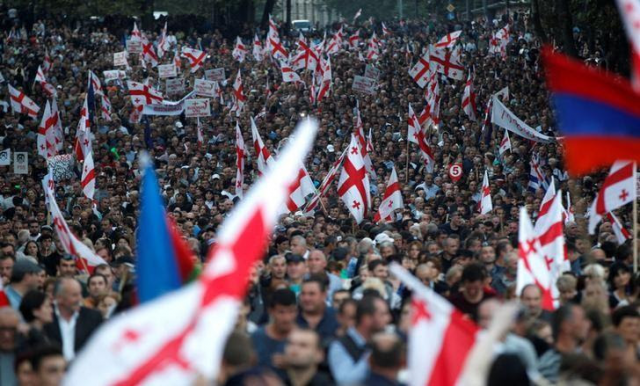2016 Election Finds Georgia at a Crossroads
Four years after Georgia’s first peaceful transfer of power since the tiny South Caucasus nation regained its independence following the collapse of the Soviet Union, Georgian voters will once again go to the polls on October 8 amid widespread public apathy and a bitter disillusionment towards the country’s main political parties.
This year’s elections will be Georgia’s eighth parliamentary poll since the ex-Soviet republic broke free from its imperial masters in Moscow in 1991.
The elections appear as though they will be broadly competitive, but no less contentious, than in previous years. Much of that has to do with a certain malaise that has afflicted the general public since the last election in 2012.
While parties abound, Georgia’s political culture is plagued by a particularly corrosive brand of identity politics that pays little attention to platforms or ideology.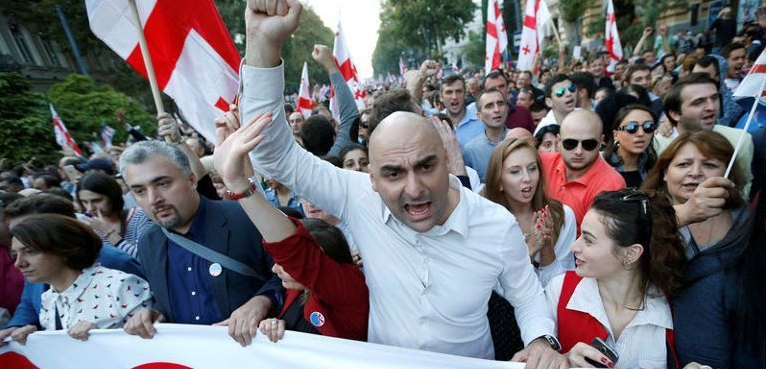
The country's parties operate at an almost comical level of immaturity that often takes the form of public bickering, juvenile backbiting and violent outbursts.
This year's campaign season has regularly featured televized punch-ups, illicit wiretappings, incriminating videotapes and allegations of coup plots.
This year’s elections have done little to change previous bad habits.
In the last week, leading opposition lawmaker Givi Targamadze from the United National Movement was unhurt after his car was packed with a bomb that exploded in the capital Tbilisi on Tuesday.
Five passersby were injured in the attack.
48 hours before the assassination attempt, two men were shot and wounded at an open-air speech given by independent candidate and former Defense Minister Irakli Okruashvili during a campaign rally in the central Georgian town of Gori.
Saakashvili, Ivanishvili Renew Bitter Rivalry
This year’s election once again pits the ruling Georgian Dream Party led by oligarch Bidzina Ivanishvili – Georgia’s richest man; against former President Mikheil Saakashvili’s United National Movement, which lost the 2012 election after a decade in power.
Neither Saakashvili – who is currently in exile in Ukraine’s Odessa region where he serves as an appointed governor for his close ally, Ukrainian President Petro Poroshenko – nor Ivanishvili is on the ballot this year.
Ivanishvili stepped down as prime minister and officially retired from politics in 2013, but he remains the Georgian Dream’s “Grey Cardinal” who calls the shots and dictates party policy.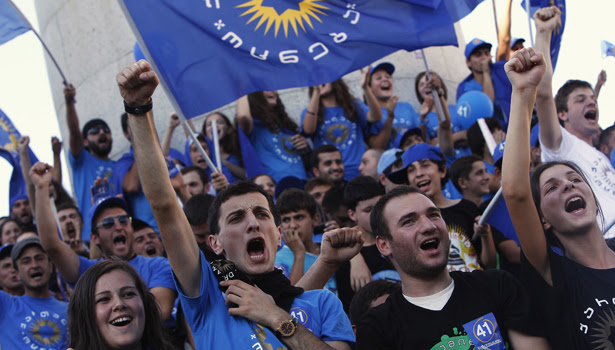
Though he no longer holds Georgian citizenship after having it stripped in 2015 and is currently warranted on what he calls politically motivated charges, Saakashvili has vowed to return to Georgia should his United National Movement come out ahead in the polls.
As Georgia’s original pro-Western standard-bearers, the United National Movement remains the staunchest proponent of Euro-Atlantic integration in the country.
The UNM has never tempered its headlong embrace of Western-style reforms and demand for a near dictatorial interpretation of the rule-of-law, and they certainly can be credited with having carried out landmark achievements in the first few years after coming to power. But the UNM has stumbled badly since a bloody five-day war with Russia in 2008 resulted in the effective loss of 20 per cent of Georgia's territory to Moscow-backed separatists.
The current lack of significant economic progress, high unemployment and the numerous stalled or abandoned reforms that have stunted Georgia's growth since Ivanishvili's party came to power may work in the UNM's favor. The party, however, is still marred in the public's eyes by the legacy of the excessively harsh methods the Saakashvili-led government used in its attempt to bury Georgia’s destructive and endemically corrupt post-Soviet past.
With Saakashvili out of the country and no clear leader guiding the UNM in his place, it remains to be seen whether the former ruling party can garner enough votes outside of its core constituency to come out on top in Saturday’s elections.
A close loss at the polls could see the UNM cry foul and take to the streets in an attempt to overturn the results. But public opinion is unlikely to back such a move, as only die-hard UNM supporters still seem able to stomach Saakashvili’s blowhard and often buffoonish calls for “a second Rose Revolution” – a reference to the 2003 uprising that ousted the corrupt government of former President Eduard Shevardnadze and brought Saakashvili to power.
The party's greatest hope may be the candidacy of Saakashvili’s Dutch-born estranged wife Sandra Roelofs, who is a UNM candidate in a single-member constituency in Zugdidi, the capital of Georgia’s western Megrelia region.
She's a well-respected advocate for human rights and a strong supporter of Georgia's educational reform, as well as an occasional critic of her own husband's excesses.
Despite being the UNM’s bitter political rival, the Georgian Dream has paid lip service to the pro-Western agenda of its predecessor.
The current government has continued down the path of implementing key reforms aimed at eventually joining the EU and NATO in the not-so-distant future. But the party has been dogged by dozens of resignations since it came to power four years ago, with many disgruntled former party members accusing Ivanishvili of wielding supreme power and using his position to focus on settling personal scores with political rivals instead of making sound policy decisions.
Former allies claim they resent the role the mercurial Ivanishvili plays in micromanaging the Georgia Dream’s affairs, while the Georgian public has grown tired of the GD’s endless, and often unhinged, claims that the UNM is trying to overthrow the current government.
Ivanishvili’s often patronizing tone and messianic complex – which is matched only by Saakashvili’s brand of self-importance – has angered and alienated both voters and former political partners.
His continued close association with Russian businessmen and latently pro-Russian sentiments have also alarmed many Georgians as he’s guided the Georgian Dream down a more Moscow-friendly path after years of Saakashvili’s stridently pro-NATO, business-friendly agenda.
Ivanishvili’s recent refusal to denounce the followers of Georgian-born Soviet dictator Joseph Stalin also raised more than a few eyebrows.
Public scepticism has also been fuelled by the Georgian Dream's dismal handling of the country's struggling economy and Ivanishvili’s lavish spending on eccentric vanity projects. Coupled with a major slowdown of investments from once friendly Western countries and the utter lack of a strategic economic plan has led to the general perception that the GD is a "do nothing" party.
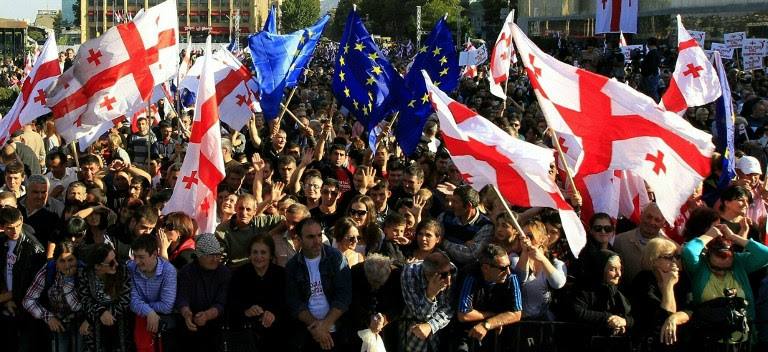
Outside Parties Looking In
This year’s political field is the most crowded in Georgia’s history, but none of the contending parties has polled over 20 per cent in the days leading up to the election, leaving several second-tier parties to compete for votes that will carry them across the 5 per cent threshold needed to enter the parliament.
Opera star-singer-turned-opposition-party leader Paata Burchuladze's State for the People coalition got off to much fanfare earlier in the year but has since been mired in inter-party squabbles and later banished its collation partner Girchi, accusing it of being financed and secretly run by Ivanishvili.
Burchuladze positioned himself as a populist, pro-Western politician who wants to break the cycle of successive GD and UNM governments, but has yet to translate his moderate celebrity into a viable mass movement.
Charismatic former Defense Minister Irakli Alasania, who was once thought of as a shoe-in to lead the country, has seen his Free Democrats plummet in the polls.
Alasania continues to have a degree of popularity in certain circles, both domestically and in the West. But his star has waned in the last two years as he has backed away from grabbing the reigns of his own party's leadership and has utterly failed to forge a coherent alternative to the Georgian Dream and United National Movement. Instead, he's become Georgian politics' enfant terrible; prone to wild accusations and public tantrums.
He and his Free Democrats will likely vie with Parliamentary Speaker David Usupashvili’s Republican Party for the third largest representation in the next parliament.
The recent flood of Russian media outlets in Georgia has helped facilitate a growing public scepticism towards the West and a certain nostalgia for the stability of the Soviet-era, as well as a desire for the cheap Russian money that is often attached to those rose-colored memories.
Despite the favorable optics, Nino Bujanadze’s slavishly pro-Russian Democratic Movement will not see a significant increase in her party’s representation.
Burjanadze will continue to caucus with other pro-Moscow parties as they attempt to capitalize on the robust media and business presence that Russia has established in the country over the last 2-3 years.
Public Apathy Will Play a Role
The prospect of a new “political messiah”, as the Economist dubbed Georgia’s first four post-Soviet leaders, has all but been abandoned by the country’s citizens after more than two decades of misguided strategic initiatives, economic plans and broken promises.
With the economy reeling following the sharp devaluation of the national currency and slow progress towards Georgia’s attempts to move closer to the EU, the country’s largely undecided electorate find themselves at a crossroads. 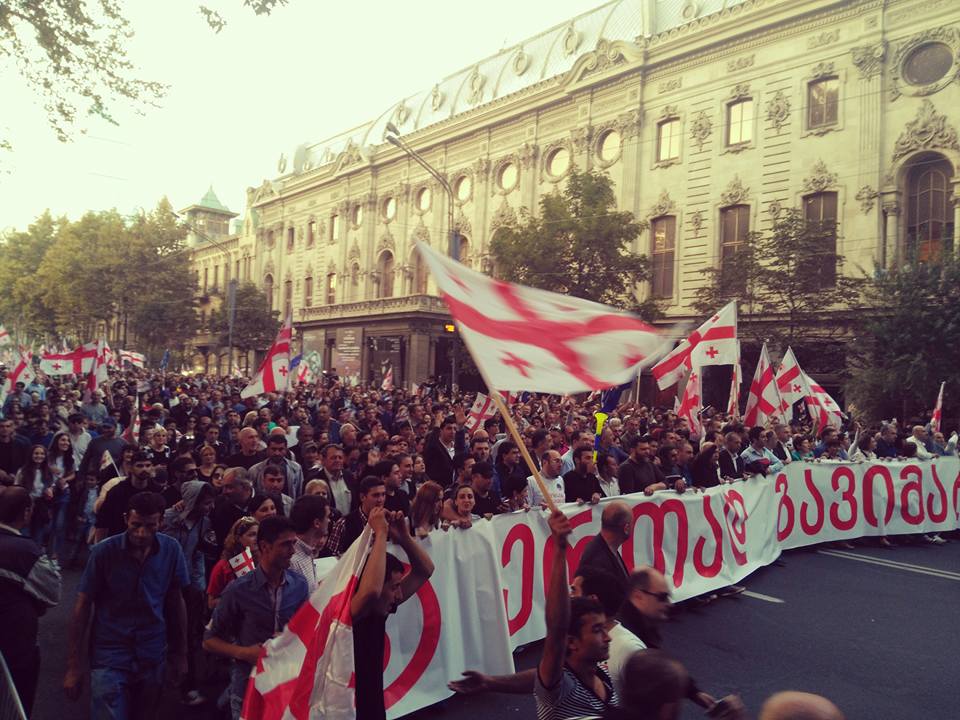
Unlike previous elections, there is little potential for a national uprising or the sudden collapse of the ruling government, as was the case in 2003.
Today's constant bickering between the UNM and GD bears no resemblance to the early 1990s when armed gangs and the inflammatory ramblings of Georgia’s first President Zviad Gamsakhurdia plunged the country into a period of civil war, reprisal killings, warlordism and rampant organized crime.
The reformist and modernizing achievements of the past two Georgian governments have all but eradicated the worst elements of Georgia's political culture, which is impressive considering Russia’s continued occupation of Georgia’s Abkhazia and South Ossetia regions and a noticeable slowdown in private investment coming in from the West.
Moscow’s investments and its robust media presence, all of which have grown under the Georgian Dream, have become a point of deep concern to certain along with the rise of xenophobia and ultra-nationalism amongst the country's young male population. The latter two are often fuelled and condoned by radical members of the increasingly powerful Georgian Orthodox Church and could lead to a far deeper social crisis in the future.
Led by the elderly former KGB informant Patriarch Ilia II, the Church has positioned itself as a major player in Georgia's social affairs and has helped steer the country away from its European orientation for an open embrace of the "Eurasianism" that has been proselytized by Moscow Patriarch Kirill.
The reactionary ideology rejects the Western concepts of human, women's and minority rights as antithetical to both Orthodox and national traditions.
Through its influence, the Church has forced most of Georgia's political parties to curry favor with the Patriarchate to remain relevant in modern Georgian society.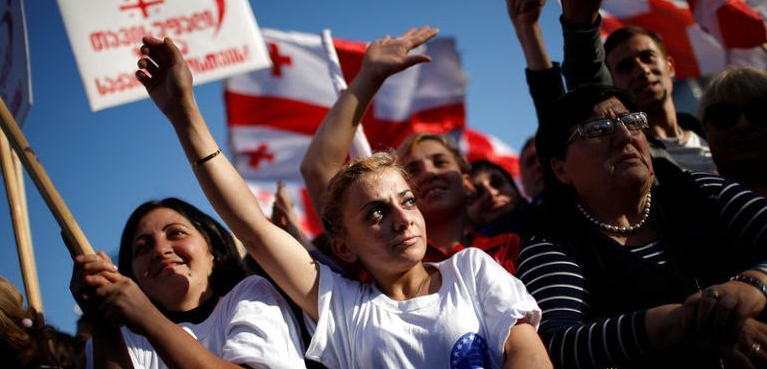
Critical, Tough Choices Ahead
The voting population's deep apathy towards the elections and the existing political parties and their move towards the Church and fringe elements of the political spectrum will be the guiding light of the next four years.
The usual countermeasure to the rise of widespread chauvinism and reactionary elements – a strong civil society led by the nation's youth and young professionals – will simply not be a factor in this year's elections.
Georgia's once vibrant, politically active youth who – those who stood up to the might of the Soviet Union's security apparatus in April 1989 and the group who led the pro-democracy Rose Revolution in 2003 – have all but disappeared from the country's political stage.
Most of the older generation have left the country after years of disappointments. Their successors failed to pick up the baton and now make-up one of Georgia's most politically comatose generations since the height of the Brezhnev-era of the 1970s.
Whomever the next round of elected officials are, they must continue with the critical, if incremental, reforms and Western orientation that the two previous governments pursued and represent their constituencies by rejecting the frequent abuses of power and politically motivated witch-hunts that have characterized Georgian politics since the country re-established her independence more than a generation ago.
By Nicholas Waller
Photos: Reuters, Associated Press, Nicholas Waller
